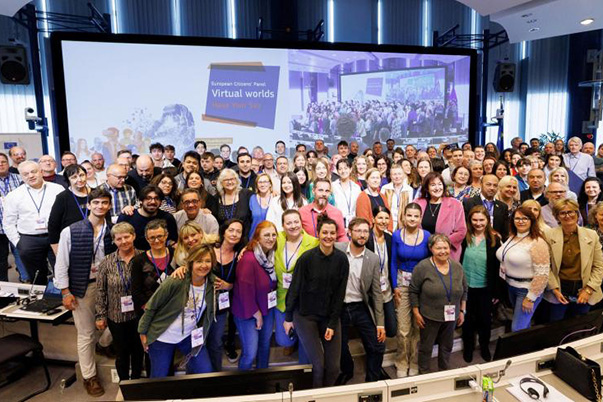
Chapter 9 – Institutional developments and strengthening democracy
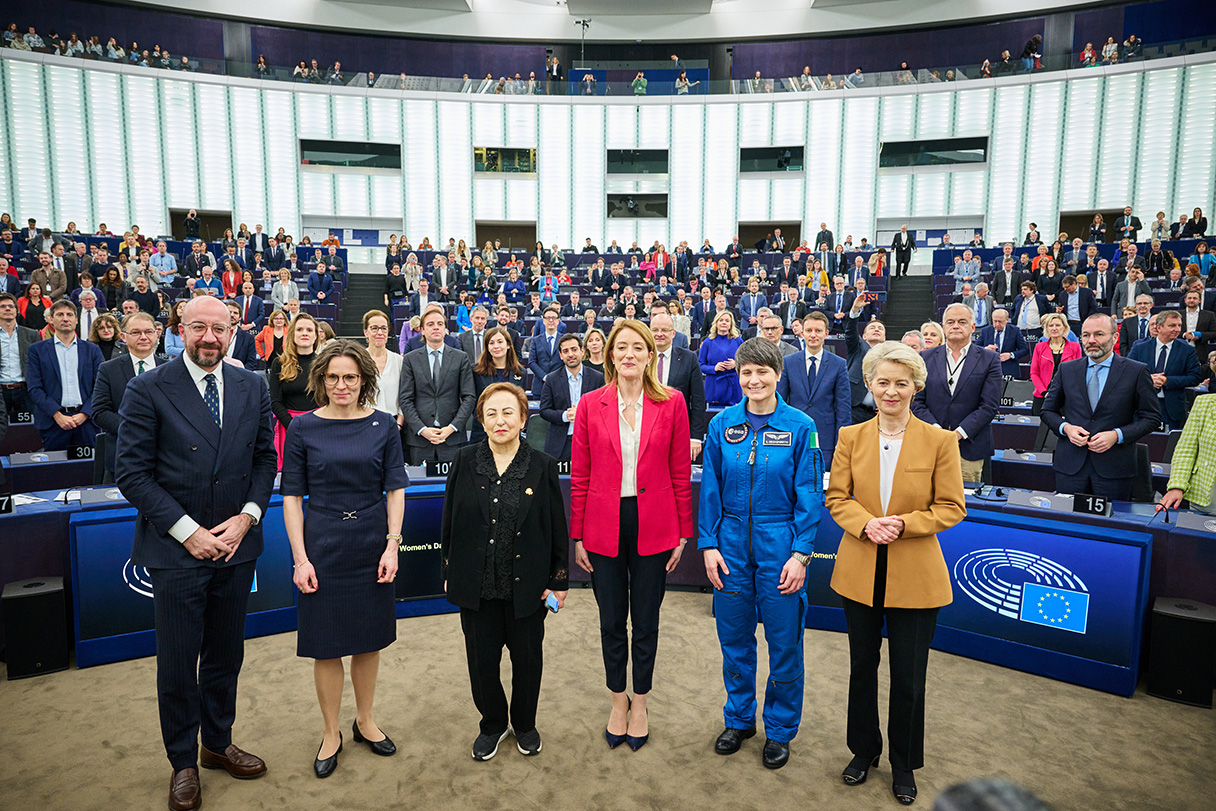
Introduction
In 2023, the European Union’s institutions and bodies worked closely together to address the common interests of the EU and deliver results for its citizens. Efforts continued to be made to improve the EU’s lawmaking process and to reform administrations so they are better prepared for the opportunities and challenges of a changing world. Achieving better results for citizens by improving EU rules is a shared objective, and is the responsibility of all of the EU institutions and Member States. This includes empowering citizens to participate actively in the democratic process.
Working together
The EU’s institutional set-up is unique, and its decision-making system is constantly evolving. In principle, the European Commission proposes new laws, and the European Parliament and the Council of the European Union, as co-legislators, adopt them. The Member States then implement the laws, and the Commission ensures that they are properly applied. The work of these institutions is complemented by other institutions and bodies - open a new tab..
In 2023, EU institutions made progress on several key legislative initiatives and stepped up efforts to make the EU more transparent, more accountable and more effective. Bearing in mind the Commission’s communication ‘Towards a resilient, competitive and sustainable Europe - open a new tab.’, EU leaders met in Granada, Spain, in October to launch a discussion aimed at setting the European Union’s general political directions and priorities for the years to come.
The presidency of the Council of the European Union rotates between the Member States every 6 months. In 2023, the presidency was held first by Sweden and then by Spain.
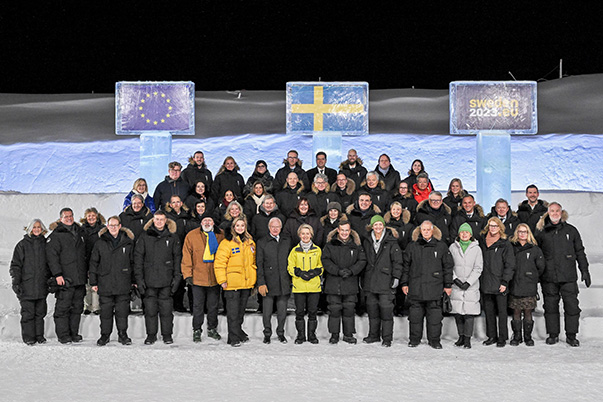
Progress on legislative initiatives
In 2023, the EU’s co-legislators made progress on several major initiatives.
On solidarity with Ukraine and military support (see Chapter 1), the Parliament and the Council reached a political agreement on the Act in Support of Ammunition Production, mobilising €500 million to manufacture ammunition and missiles. They also agreed on new measures to urgently boost the capacities of the EU defence industry in ammunition production (the European Defence Industry Reinforcement through Common Procurement Act – see Chapter 8). In view of Russia’s continued war of aggression against Ukraine, the Council further agreed to the 11th and 12th packages of economic and individual restrictive measures (sanctions).
Progress was made on strengthening the economy and the EU’s competitiveness, with agreements between the co-legislators on important proposals such as the EU Green Bonds Regulation, the banking package and the Central Securities Depositories Regulation, along with the groundbreaking Critical Raw Materials Act (see Chapter 2). Additionally, the Council agreed on a common position on the Commission’s proposal to reform the EU’s economic governance rules.
Regarding the green agenda, the Parliament and the Council adopted key pieces of legislation delivering on the climate targets for 2030. These include new rules to reduce final energy consumption and raise the share of renewables in the EU’s energy mix (see Chapters 3 and 4).
Concerning the digital transition, the Parliament and the Council adopted new rules to strengthen Europe’s semiconductor sector (the Chips Act), which will reinforce the EU’s technological sovereignty. The co-legislators also adopted the Data Act, which will ensure fair access to data, and reached a political agreement on the Artificial Intelligence Act, which will promote the safe use of artificial intelligence in the EU for the benefit of all (see Chapter 5).
Negotiations between the Parliament and the Council ended in a political agreement on the New Pact on Migration and Asylum (see Chapter 7) and on the transparency of political advertising (see below). Progress was also made on the directive on improving the working conditions for platform workers (Chapter 6). Moreover, with regard to the Schengen area, the Council unanimously agreed to lift air and maritime internal border controls with Bulgaria and Romania (see Chapter 7).
Furthermore, the political agreement on the targeted revision of the Financial Regulation marks a significant step in protecting the EU budget (see Chapter 2), enhancing transparency, improving crisis management and reducing administrative burdens on Member States.
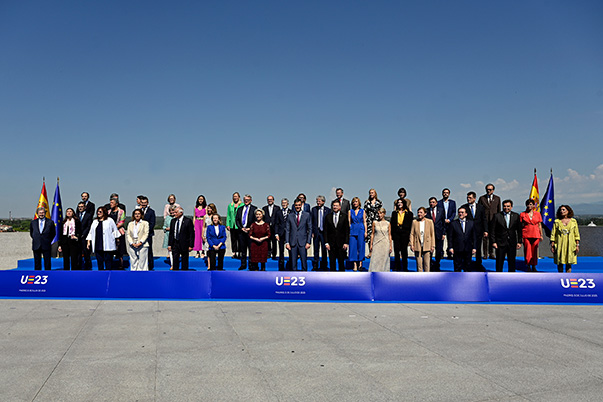
Making sure that EU rules are applied
EU law must be implemented and applied fully and correctly everywhere so that people and businesses can enjoy their full benefits. To ensure this, the Commission opened more than 500 new infringement procedures in 2023, either because Member States had failed to transpose EU directives into national law on time or because they were not applying EU rules correctly or their national rules did not fully conform to EU law.
On the other hand, 1 000 infringement procedures could be closed during the year as Member States achieved compliance with EU rules. This will bring concrete benefits, such as stronger rights in the digital single market, improved energy efficiency, greater protection for the environment, better financial services and safer transport.
The Commission also continued its work on preventing breaches in the first place, for example by providing early support to Member States on the implementation of EU law through practical guidance, meetings, training and technical assistance.
Active interinstitutional cooperation
The European Economic and Social Committee and the European Committee of the Regions provided important and relevant contributions to the Parliament, the Council and the Commission, and engaged strongly in supporting Ukraine. The European Economic and Social Committee pursued its initiative to select enlargement candidate members, which seeks to involve civil-society representatives from EU candidate countries in the daily advisory work of the Committee.
Via its European Alliance of Cities and Regions for the Reconstruction of Ukraine - open a new tab., the European Committee of the Regions highlighted the importance of decentralisation and strengthening local self-governance in Ukraine’s recovery and reconstruction process.
The national parliaments of most Member States continued their active cooperation with the EU institutions, scrutinising proposed new laws for their respect of the subsidiarity principle. The principle of subsidiarity defines the circumstances in which it is legitimate for action to be taken by the EU, rather than by the Member States. In this respect, the national parliaments raised concerns in only a very few cases. They participated in the written and oral political dialogue with the Commission on a wide range of topics, and in interparliamentary meetings hosted by the European Parliament.
Relations between the other institutions and the European Ombudsman - open a new tab. continued to be both good and very constructive. The Commission remains the main addressee of the Ombudsman’s inquiries as the institution with the most direct dealings with the public. In 2023, the Commission implemented about three quarters of the Ombudsman’s proposals, and cases of maladministration were very rare.
As the guardian of the EU’s finances, the European Court of Auditors carried out a series of financial and performance audits, including in areas such as the pandemic recovery fund NextGenerationEU, the EU’s economic competitiveness, resilience to security threats, respect for European values, climate change and combating fraud. As the Court’s main auditee, the Commission accepted the vast majority of recommendations addressed to it, to ensure that EU funds are raised and spent in accordance with the relevant rules and that they achieve the intended results.

Good administration
Strengthening public trust
Transparency, integrity and accountability are the key characteristics of a democracy based on the rule of law. They promote good governance and build trust in the policymaking process. They are also extremely important political tools in preventing corruption. Following allegations of corruption and the subsequent arrest of a Member of the European Parliament at the end of the previous year, in 2023 the Parliament implemented a set of reforms - open a new tab. aimed at strengthening its integrity, independence and accountability as a way of preventing further interference in its work.
With a view to strengthening public trust in the EU institutions, in June the Commission presented a proposal - open a new tab. for an interinstitutional ethics body with the aim of establishing common standards for the ethical conduct of members and a formal mechanism for cooperation and exchange on ethical requirements. The Commission invited all EU institutions (the Parliament, the European Council, the Council, the Court of Justice, the European Central Bank and the Court of Auditors, along with the European Economic and Social Committee and the European Committee of the Regions) to begin negotiations and organised the first political and technical meetings on a potential agreement.
In June, the European Central Bank formalised its accountability arrangements - open a new tab. with the Parliament. The dialogue between the Central Bank and the Parliament is of key importance in this respect. It allows the Bank to explain its actions and policies in detail to the elected representatives of EU citizens, and to listen to their concerns. In this way, citizens and their representatives can form a judgement on the Bank’s performance in view of its primary objective of maintaining price stability.
Better Regulation
The Commission’s Better Regulation - open a new tab. agenda is the centrepiece of its work to ensure the EU’s competitiveness and resilience through smarter, more efficient and more effective regulation. This builds on a proven framework, recognised - open a new tab. by the Organisation for Economic Co-operation and Development.
In 2023, the Commission committed - PDF file, open a new tab. to reducing the burden associated with reporting requirements by 25 % over time. It put forward 41 initiatives in its work programme - open a new tab., making it a priority to streamline reporting requirements that impose disproportionate burdens on businesses or administrations. The aim is to reduce administrative burdens without undermining policy objectives or lowering social, economic, environmental or any other standards, including consumer protection. The process will be informed by 200 contributions that were received from businesses, public authorities, civil society and citizens in a dedicated call for evidence.
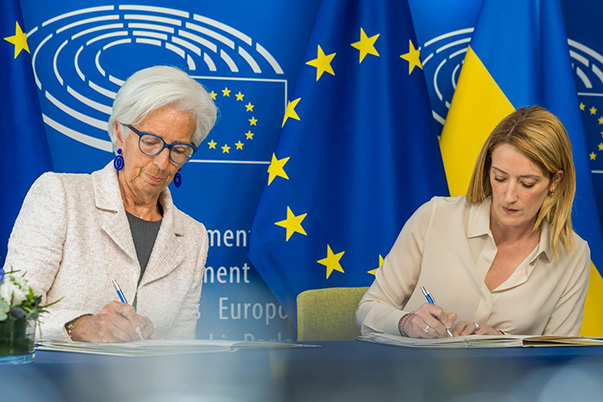
Rationalising and simplifying reporting requirements
How?

The objective of rationalising and simplifying reporting requirements involves several key steps. The first step is to eliminate outdated reporting elements, such as those with limited usability. This effort supports the modernisation of the reporting process by implementing digitalisation and new technology to gather data more effectively. Additionally, the strategy calls for a decrease in the frequency of reportSafeguarding the rule of lawing, the merging of similar duties, a reduction in the number of affected businesses and the provision of ample time for stakeholders to adjust to the new requirements.
Examples
| Proposal | Aim | Expected savings/benefits |
|---|---|---|
| Reformed Union Customs Code | To create a single EU interface and facilitate data reuse | €2 billion |
| Revised Combined Transport Directive | To simplify procedures (e.g. use digital transport data platforms for proof of eligibility) | €430 million |
| Adjusted Accounting Directive thresholds | To reduce reporting requirements | More than 1 million companies are expected to benefit |
| Alternative dispute resolution | To remove some disclosure obligations and replace the online platform | Around €630 million |
The Commission also continued implementing the ‘one in, one out’ approach, which ensures that any newly introduced burden is offset by removing an equivalent burden in the same policy area. The approach complements the Commission’s Regulatory Fitness and Performance programme - open a new tab., through which the Commission seeks to systematically identify and remove red tape and unnecessary costs whenever EU legislation is revised and evaluated.
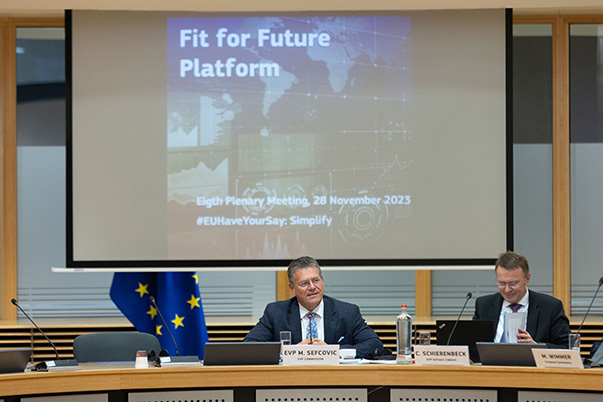
Strengthening administrative cooperation
Efficient national public administrations are critical to transforming EU and national policies into reality; implementing reforms to the benefit of people and businesses alike; and channelling investment towards achieving the green and digital transitions and greater competitiveness. With the aim of enhancing the European administrative space, the ComPAct initiative - open a new tab. offers a new set of principles to help Member States address skill gaps and deliver on the target of having 100 % of key public services accessible online by 2030. This will enable EU economies and societies to deliver on the ambitious 2030 climate and energy targets, and will make EU public administrations less bureaucratic, faster in delivering services, more transparent and closer to the people. In this respect, the agreement - open a new tab. on the Interoperable Europe Act in November was an important milestone on the way to achieving the EU’s digital targets for 2030 - open a new tab. (see Chapter 5). Once adopted, the act will take the exchange of information in the EU public sector to the next level and accelerate the sector’s digital transformation.
Strategic foresight
To future-proof its policies in the increasingly complex global context, the EU is progressively embedding foresight into its policymaking. Possible scenarios, trends, risks and emerging issues are explored, providing insights that are useful in strategic planning and policymaking, in line with the Better Regulation toolbox. Ultimately, strategic foresight will help the EU to anticipate and respond better to future needs and to otherwise unexpected adverse developments and complex crises, like those we have seen in recent years.
The 2023 Strategic Foresight Report - open a new tab. analysed the social and economic challenges on the path towards achieving sustainability and maintaining people’s well-being. It also shed light on how successfully managing those challenges can help the EU strengthen its global leadership. The report suggests 120 concrete areas for action and presents the first results of the pilot scheme on the ‘beyond-GDP - open a new tab.’ approach, which aims to support the development of progress indicators that are more inclusive of environmental and social aspects.
During the year, the Commission also further developed its cooperation with Member States through the EU-wide Foresight Network - open a new tab., established in 2021, which has contributed to an increased amount of interest and investment in strategic foresight at the national level. The network also aids broader discussions at the EU level, such as the work on the Resilient EU2030 - open a new tab. report during the Spanish Council Presidency and the declaration - open a new tab. resulting from the European Council in Granada, Spain.
The European Strategy and Policy Analysis System brings together nine EU institutions and bodies to anticipate future risks and opportunities. In 2023, cooperation focused on the preparation of the new Global Trends Report - open a new tab., which is due in early 2024.
Ten areas for action to achieve sustainability
Reinforcing the EU’s crisis preparedness and response toolbox
A new European social contract
Stronger democracy through citizen agency and fairness
Increased labour market participation and a focus on future skills
Shifting policy and economic indicators towards sustainable and inclusive well-being
Leveraging the Single Market to champion a net-zero economy
A stronger link between the EU’s internal and external policies
A shift in production and consumption towards sustainability
Public budgets fit for sustainability
Creating a Europe of investment by increasing private flows
Strengthening democracy
Safeguarding the rule of law
With the Russian war of aggression against Ukraine continuing to rage, it is vital that democracy, human rights and the rule of law be proactively defended and upheld, in the EU and beyond. The 2023 ‘Rule of Law Report - open a new tab.’ made an important contribution to this, showing that 65 % of the rule-of-law recommendations issued to Member States in 2022 had been fully or partially addressed. This reflects the significant efforts that are ongoing in the Member States to undertake the necessary reforms to strengthen the rule of law in four key areas: the justice system, the anti-corruption framework, media pluralism and freedom. Given the positive results in the Member States, in 2023 the Commission announced - open a new tab. that it would open the ‘Rule of Law Report’ to the more advanced accession countries to support them in their reform efforts.
Foreign interference in democratic systems
81 %

of people in the EU agree that foreign interference is a serious problem that should be addressed
81 %

of people in the EU agree that entities representing foreign governments on EU territory should be registered to prevent covert interference
The role of civil society in promoting and protecting democracy
87 %

of people in the EU see an important role for civil society in protecting democracy and promoting democratic debate
Source: Flash Eurobarometer 528 - open a new tab., December 2023.
Democracy and elections
78 %

of people in the EU are worried that voting decisions could be based on disinformation
72 %

of people in the EU are worried that elections in the EU could be manipulated through cyberattacks
70 %

of people in the EU are worried that foreign countries could covertly influence elections
65 %

of people in the EU are worried that they might be pressured to vote in a certain way
63 %

of people in the EU are worried that election results could be manipulated
53 %

of people in the EU are worried that people who are not entitled to vote would be voting

Defending democracy
In a healthy and thriving democracy, citizens can freely express their views, choose their political leaders and have a say about their future. Democracy in the EU is strong, but it is facing challenges from rising extremism, election interference, the spread of manipulative information and threats against journalists.
The defence-of-democracy package - open a new tab., adopted in December, aims to address challenges such as foreign interference and to build resilience from within by encouraging civic engagement and democratic participation. The centrepiece of the package is a proposal - open a new tab. to enhance transparency and democratic accountability by shedding light on covert foreign influence. The measures will also improve the functioning of the internal market through common standards for interest-representation activities carried out on behalf of non-EU countries. In addition, the package includes two recommendations: one to strengthen electoral processes - open a new tab. in the EU and another to promote the inclusive participation - open a new tab. of citizens and civil society in policymaking.
A political agreement was also reached on the new rules - open a new tab. on the transparency of political advertising, under which political adverts will need to be clearly labelled and must include information such as who paid for them and how much; to which election, referendum or regulatory process they are linked; and whether they are targeted.
Promoting free and fair elections, ensuring the rule of law and guaranteeing media freedom are building blocks to create a space where every citizen feels free and empowered.
European elections
The European Cooperation Network on Elections - open a new tab. promotes concrete and practical exchanges on a range of topics relevant to ensuring free and fair elections, including cybersecurity. The network will continue supporting cooperation among Member State authorities in the run-up to the 2024 European elections.
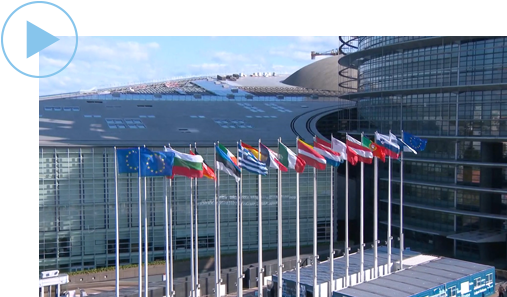
Media freedom
In 2023, a political agreement was reached on the European Media Freedom Act - open a new tab., a new set of rules to better protect media and journalists against political interference and to ensure that media can operate more easily across borders. The act proposes a new independent European Board for Media Services, comprised of national media regulators or bodies, to strengthen cooperation at the EU level, including against foreign propaganda, and help with the implementation of the new rules.
An agreement was also reached on the new rules - open a new tab. to protect journalists, rights defenders, civil-society organisations and others who are the targets of strategic lawsuits against public participation. The new rules will include the early dismissal of unfounded claims, remedies against abusive court proceedings and protection against foreign judgments that will not be recognised or enforced in the EU.
The Free Media Hub EAST project - open a new tab., led by the Prague Civil Society Centre and backed by the Commission, awarded over €2.2 million in grants in 2023 to provide support to existing and established independent Belarusian and Russian media working in the EU (mainly in Czechia, Germany, Latvia, Lithuania and Poland).
The EU remembers the struggle and continues to honour all those who have paid the ultimate price for liberty. The Parliament’s 2023 Sakharov Prize for Freedom of Thought - open a new tab. was awarded to Jina Mahsa Amini and the Woman, Life, Freedom Movement in Iran.

Empowering citizens
The EU is committed to listening more closely to citizens and stakeholders. Opening up policymaking processes to the public is another way to help the EU to become more transparent, accountable and effective.
Over the last several years, the Commission has further strengthened its consultation activities through the Have Your Say - open a new tab. portal, which is the centralised page for all feedback and input from citizens and stakeholders. Input can be provided on calls for evidence, adopted proposals and draft acts. To reach out more widely, the Commission has increased the number of consultations translated into all official EU languages (from 59 % of public consultations translated in 2019 to 83 % in 2023).
Citizens’ Panels
Between December 2022 and April 2023, the Commission organised the first series of the new generation of Citizens’ Panels - open a new tab., embedding this new format of citizens’ participation into the policymaking process. Building on the experience acquired during the Conference on the Future of Europe, and responding to the calls expressed during the conference, the panels allow 150 randomly selected citizens to deliberate and make recommendations ahead of Commission proposals.
The panels discussed the initiatives on food waste, virtual worlds and learning mobility. The recommendations were gathered in citizens’ reports, which informed the preparation of and were published alongside the final Commission proposals. The Commission initiatives were put forward on 5 July (food waste), 11 July (virtual worlds) and 15 November (learning mobility) respectively. The new Citizens’ Panels contribute to the wider consultation process, through which the Commission collects evidence from citizens and stakeholders.
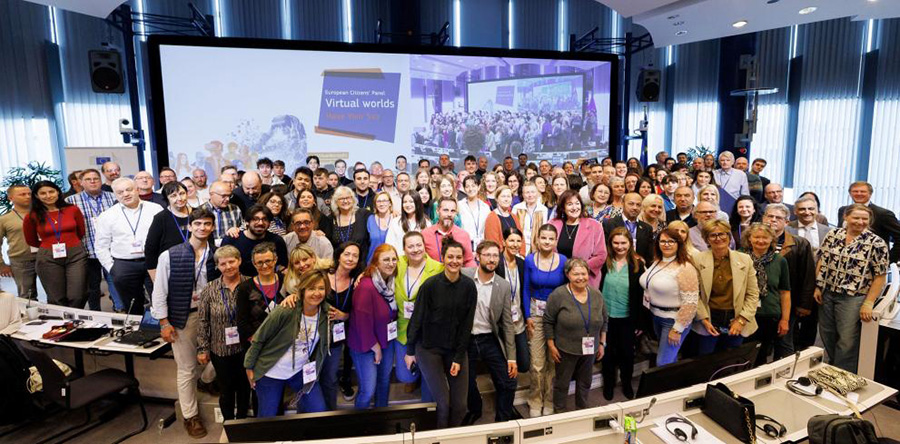
European Citizens’ Initiatives
In April, the Commission registered the 100th European Citizens’ Initiative - open a new tab. since their introduction in 2012. Over the year as a whole, the Commission registered 37 new initiatives calling for EU action in various fields, such as the dignified treatment of migrants, animal welfare, rail networks, taxation, the preservation of Ukrainian culture and education on EU citizenship.
The Commission also replied to four successful initiatives in 2023, calling for a reduction in the use of pesticides, an end to the trade in loose shark fins, an end to animal testing and a ban on the production of and trade in fur. So far, 10 initiatives have received more than 1 million statements of support since 2012.
The 2023 report - PDF file, open a new tab. on the new European Citizens’ Initiative rules, which have been in force since 2020, shows that they deliver a more accessible, less burdensome and easier-to-use framework for organisers and supporters. It also suggests practical improvements on how to increase general awareness and inform citizens of their right to use the Citizens’ Initiative, and on how to provide more visible follow-up to successful initiatives.
Strengthening citizens’ rights
EU citizenship is one of the European Union’s most significant achievements. To mark the 30th anniversary of EU citizenship, the Commission proposed measures - open a new tab. to strengthen citizenship rights, accompanied by guidance for citizens with the most essential information on their rights. The 2023 EU citizenship report - open a new tab. highlights the progress made in promoting citizenship rights, common values and democratic participation in the EU since the publication of the last such report in 2020.
Empowering children and young people
Almost 20 % of EU citizens are children. They have a right to express their opinion on matters that concern them. In 2023, the EU Children’s Participation Platform - open a new tab. created even more opportunities for under 18s to take part in the decision-making process. Almost 50 organisations working directly with children across the EU have become members of the platform since it was set up in October 2022.
The first General Assembly of the EU Children’s Participation Platform, co-chaired by and co-created with children and teenagers from the EU, took place in Brussels in June. Around 60 children came together to discuss the topics – namely democracy, climate change, mental health, safety and poverty – that will steer the work of the platform for 3 years.
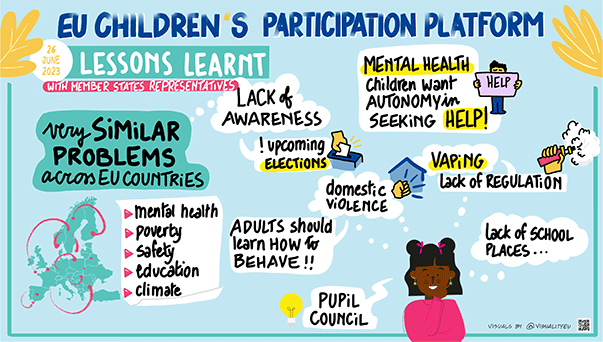
The 2022 European Year of Youth - open a new tab. put young people high on the political agenda at all levels and contributed to integrating the youth perspective across various policy fields. The Year of Youth created large-scale mobilisation and engagement, raising awareness of EU opportunities among millions of young people who took part in 13 000 activities across 67 countries, through a variety of EU programmes and policy initiatives. A number of new youth participation formats were launched, ranging from the Youth Voices Platform - open a new tab. and Youth Talks - open a new tab. to the policy dialogues - open a new tab. and the pool of European young journalists - open a new tab.. Social media campaigns running from February 2022 to May 2023 resulted in 210 million views and 10 million interactions, and reached 91.4 million people.
To become active citizens, young people need to understand how democracy works and what their rights and responsibilities are. The EU Democracy in Action toolkit - open a new tab., published in May, introduces pupils to the European Citizens’ Initiative and encourages them to take an active role in European issues.
